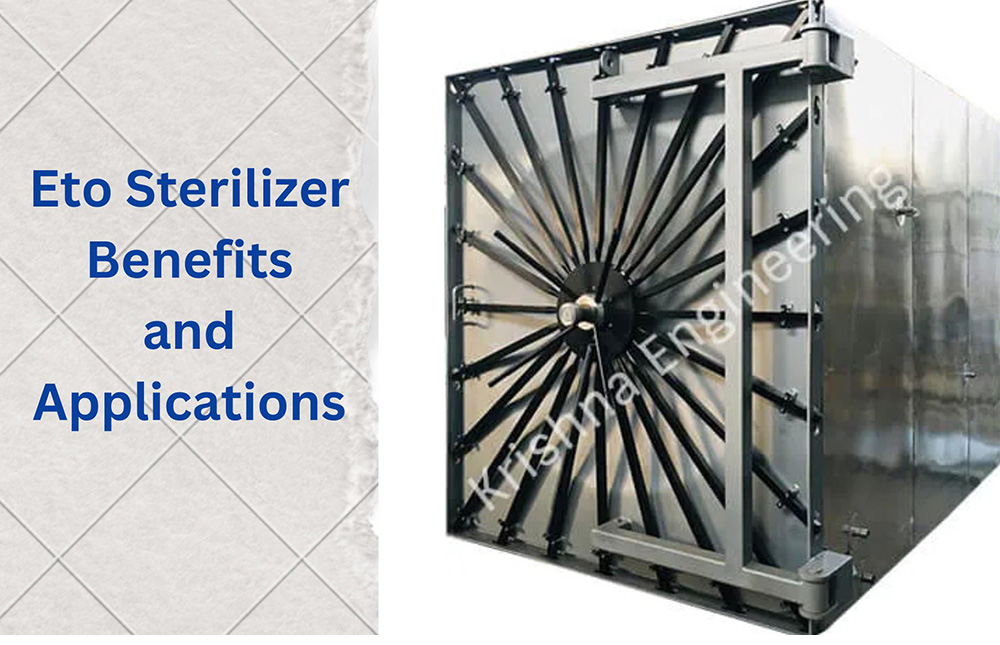Their machines are trusted by hospitals, clinics, and pharmaceutical businesses all over the world because they are dependable and successful at sterilizing medical instruments. Krishna Engineering's commitment to perfection makes them a top choice for customers looking for innovative ETO Sterilization solutions.
In the realm of medical sterilization, Ethylene Oxide (ETO) has become a critical tool for ensuring the safety and efficacy of healthcare practices. Let's dive into the world of ETO sterilization, exploring its benefits, applications, and important considerations.
Contact Krishna Engineering today for innovative and reliable ETO Sterilization solutions that exceed expectations. Trust us for your sterilization needs, and experience the difference of quality and precision in every product we deliver.
Understanding ETO Sterilization
Ethylene Oxide (ETO) sterilization is a method used to kill microorganisms on medical equipment and devices that cannot withstand high temperatures or moisture. It's highly effective and versatile, making it indispensable in various healthcare settings.
Benefits of ETO Sterilization
1. Compatibility: ETO sterilization is compatible with a wide range of materials, including plastics, rubber, and electronics, which are often sensitive to heat and moisture.
2. Penetration: The gas can penetrate packaging materials and reach deep into intricate devices, ensuring thorough sterilization.
3. Broad Spectrum: ETO is effective against a wide range of microorganisms, including bacteria, viruses, and spores.
4. Versatility: It can be used for sterilizing a variety of medical equipment, from surgical instruments to implantable devices.
5. Safety: When performed correctly following strict protocols, ETO sterilization is considered safe and reliable.
Applications of ETO Sterilization
Healthcare Facilities: Hospitals, clinics, and dental offices use ETO sterilization for critical and heat-sensitive instruments.
Pharmaceutical Industry: ETO ensures the sterility of drug manufacturing equipment and packaging.
Laboratories: Used for sterilizing laboratory equipment and tools to prevent cross-contamination.
Safety Considerations and Regulations
While ETO sterilization is highly effective, it's important to acknowledge the safety concerns associated with this method. Ethylene oxide is a toxic gas and a known carcinogen. Therefore, strict regulations and safety measures must be followed to protect healthcare workers and the environment.
Conclusion
Ethylene Oxide (ETO) sterilization plays a pivotal role in modern healthcare, offering a reliable solution for ensuring the sterility of critical medical equipment. By understanding its benefits, applications, and safety considerations, healthcare professionals can leverage ETO sterilization effectively while prioritizing patient safety.
Engaging FAQs
1. Is ETO Sterilization Safe for Medical Devices?
ETO sterilization is safe when performed in compliance with regulatory guidelines, ensuring proper ventilation and monitoring of gas levels.
How Long Does ETO Sterilization Take?
The duration varies based on factors such as the size and complexity of the items being sterilized but typically ranges from a few hours to a full day.
3. Are There Alternatives to ETO Sterilization?
Yes, alternatives include steam sterilization (autoclaving), hydrogen peroxide gas plasma, and gamma irradiation, each suited to different materials and applications.
4. What Precautions Should Be Taken with ETO Sterilization?
Operators should receive training on handling ethylene oxide safely, and proper ventilation systems and personal protective equipment (PPE) must be used.
5. How Often Should ETO Sterilization Equipment Be Validated?
ETO sterilization equipment should be regularly validated to ensure it is functioning correctly and consistently achieving the required sterilization levels.



